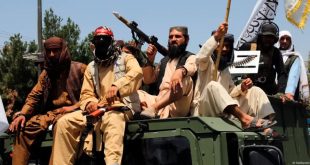By Ezzatullah Mehrdad
From 1992 to 2001, Afghanistan was on fire of civil war for first four years and in second half, Afghanistan was in hand of the Taliban insurgent group. The country was divided with no central government. It took down civil law along with government institutions; National security institutions, legislation and justice institutions, Afghans were in darkness; no press.
In 2001, establishing a new government, Afghanistan was given a priceless opportunity to re-build its broken national institutions.Partly Afghanistan has built national institutions so far; still Afghanistan needs to focus more on building the institutions. To begin, implement the national constitutions.
Zalmy Khalilzad, former US ambassador to Afghanistan and Iraq, wrote in his book, the Envoy, that Iraqi leaders used Afghanistan’s constitution as guidelines to prepare their constitution. He noted that constitution of Afghanistan was prepared based on both Islamic and liberal values. The constitution met concerns of both pro-Sharia people and liberal along with technocrat people. Afghanistan has one of the best constitutions among Islamic countries in the world. But constitution of Afghanistan has been only on paper. Both people and government of Afghanistan break constitution and other laws on daily basis.
Implementation of constitution should be priority for both the Afghan government and International community. It doesn’t only lead the country to discipline, but also move the country toward a certain destination. Theconstitution has also the capability to strength democracy, liberal values and also national institutions.
Among many national institutions, National Defense and Security Forces (NDSF) are key institutions for very existence of Afghanistan. Building NDSF institutions such as police, armed forces, airpower, and intelligence agency is much more important than fighting insurgents. Without building such strong institutions, fighting insurgents would not be succeeded. As it seems insurgency is not a one year-fight to be eliminated and likely will take years, even decades, having strong NDSF to fight insurgent groups for multi-years can be much more effective.
Besides, political polarization of NDSF is seen a clear and present danger. According to International Crisis Group (ICG), NDSF face factionalism. De-politicization of NDSF shouldn’t be neglected. Without reforms and de-politicization in coming years, NDSF will never become strong national institutions, but a bunch of soldiers in command of corrupt-Afghan politicians.
National Security institutions are one of pillars of national institutions which need to re-build. As legislate and Justice Institutions legitimize the Afghan government and serve justice, long neglecting to rebuild and reform the institutions has delegitimized the Afghan government in eyes of its fellow citizens and has made people to lose their faiths in justice institutions for serving justice. Wide spread corruption in Justice Institutions across the country led people, mostly in rural areas, to not seek justice through the government institutions. Instead, people prefer to solve their problems practicing traditional customs, such as Jirga and Shura. In addition, the overdue term of Members of Parliament completely question their legitimacy to represent Afghan population.
Holding elections of Parliament next year can legitimize legislation institutions in term of law, but it cannot make Members of Parliament trustworthy for people who mostly believe MPs seek their personal interests, rather than speaking of interests of the province they represent.
Persecution and punishing corrupted-judges and reformation of justice institutions build trust. Without paying serious attention for re-building the institutions, people gradually will turn their back to institutions which are the main parts of a government. If a government is not representative of people and do not serve justice, what is it for?
Out of government institutions, press plays the role of eyes of people on government agencies. Leaking abusive of power by politicians, corruption-related cases, and necessary information that people should know, press has the power to legitimize or de-legitimize national institutions. In Afghanistan, media has been given opportunity to be established, but the Afghan media outlets lack of professionalism. It is true Afghanistan has more than 30 TV channels, tens of Radio stations and many newspapers, weekly, monthly, and magazines. But still Afghanistan doesn’t have established and independent media. Almost all media outlets are depending on a faction.
Emerging of independent media in finger number is good news of strong and independent press to take accountable all Afghan officials. Apparently, there is no other way to support media except of investing private companies on Media and remission or reduce tax on media.
All in all, building strong national institutions will take years, even decades; it’s not of ways, but the only way to fight strategically with Afghanistan’ crisis, from insurgency to corruption.
 Afghanistan Times Latest News and Analysis from Afghanistan and the Region
Afghanistan Times Latest News and Analysis from Afghanistan and the Region




